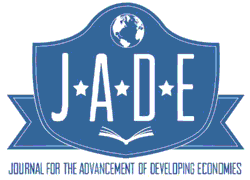Institute for the Advancement of Developing Economies

Journal for the Advancement of Developing Economies
Date of this Version
2016
Document Type
Article
Citation
Journal for the Advancement of Developing Economies, Volume 5, Issue 1 (2016), pp. 19-34.
doi:10.13014/K2XG9PBF
Abstract
This study analyses government capital and recurrent spending outlays on sectors (education, health, defense agriculture and transport and communication) believed to be critical to the growth of the economy, for the period 1980 to 2014. The Error Correction Method was adopted to analyze the short-run impact of each spending division on the prosperity of the economy. The disaggregation into capital and recurrent expenditure was done to gauge the impact each has economic growth. Empirical findings of the study reveal that though capital outlays on the sectors concerned have been more significant than recurrent spending towards achieving the goal of economic growth, more priority should still be given to capital spending. At the same time, the continuous growth in recurrent spending over capital spending should be checked. This study therefore recommends an increase capital spending in the various sectors considered, relative to recurrent spending, in accordance with our conclusions drawn from the period under study. We believe the main critical inducing outlay of government on growth is capital spending. Also, because of the interrelationship existing between the sectors considered, proper harnessing of the potentials of the various sectors is crucial towards attaining the goal of Nigeria becoming one of the twenty most industrialized nations by 2020.
Included in
Econometrics Commons, Growth and Development Commons, International Economics Commons, Political Economy Commons, Public Economics Commons, Regional Economics Commons


Comments
Copyright 2016 JADE